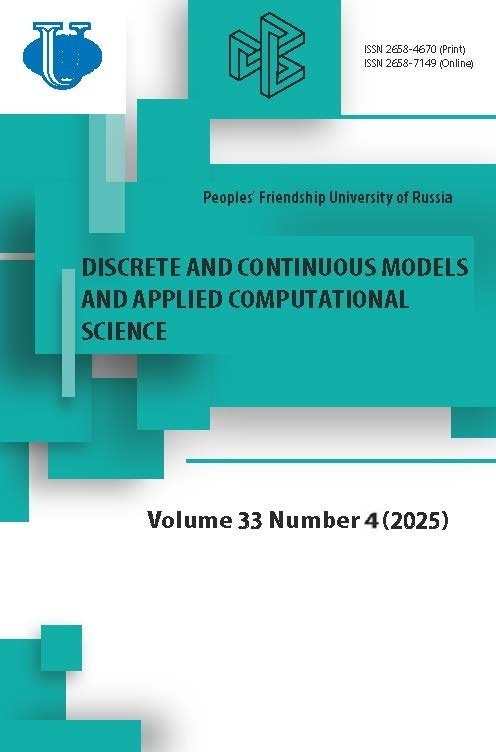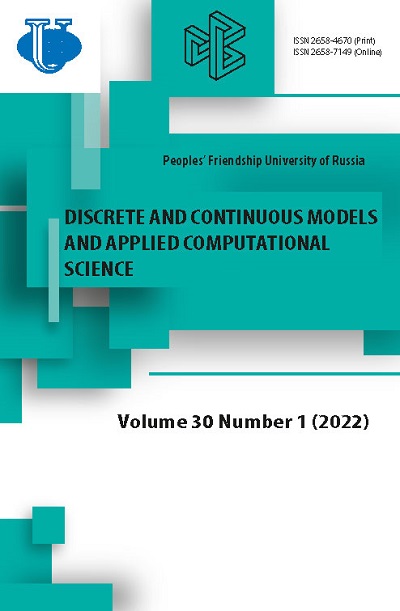Mathematical analysis of a Markovian multi-server feedback queue with a variant of multiple vacations, balking and reneging
- Authors: Bouchentouf A.A.1, Medjahri L.2, Boualem M.3, Kumar A.4
-
Affiliations:
- Djillali Liabes University of Sidi Bel Abbes
- University of Tlemcen
- University of Bejaia
- Chandigarh University, Mohali (Punjab)
- Issue: Vol 30, No 1 (2022)
- Pages: 21-38
- Section: Articles
- URL: https://journals.rudn.ru/miph/article/view/30324
- DOI: https://doi.org/10.22363/2658-4670-2022-30-1-21-38
- ID: 30324
Cite item
Full Text
Abstract
In this paper, we analyze a multi-server queue with customers’ impatience and Bernoulli feedback under a variant of multiple vacations. On arrival, a customer decides whether to join or balk the system, based on the observation of the system size as well as the status of the servers. It is supposed that customer impatience can arise both during busy and vacation period because of the long wait already experienced in the system. The latter can be retained via certain mechanism used by the system. The feedback occurs as returning a part of serviced customers to get a new service. The queue under consideration can be used to model the processes of information transmission in telecommunication networks. We develop the Chapman-Kolmogorov equations for the steady-state probabilities and solve the differential equations by using the probability generating function method. In addition, we obtain explicit expressions of some important system characteristics. Different queueing indices are derived such as the probabilities when the servers are in different states, the mean number of customers served per unit of time, and the average rates of balking and reneging.
Full Text
1. Introduction Queueing models with server vacation have been efficiently studied by many researchers in the last decades and successfully applied in various practical problems such as telecommunication system design and control, manufacturing industries, and other related systems. There are two basic vacation queueing models namely, multiple vacation, and single vacation. In multiple vacation © Bouchentouf A.A., MedjahriL., BoualemM., KumarA., 2022 This work is licensed under a Creative Commons Attribution 4.0 International License http://creativecommons.org/licenses/by/4.0/ queueing models, the server continues to take successive vacations until it finds at least one customer waiting in a queue at a vacation completion epoch [1], [2]. Nevertheless, in single vacation queueing models, the server precisely takes one vacation between two consecutive busy periods. These two types of vacation models were first introduced by Levy and Yechiali [3]. Eminent literature on the subject is found in [4]-[8] and others. Over the past few years, queueing models with Bernoulli feedback have increasingly attracted the attention of many researchers [9]-[14]. Taking into account the feedback effect makes it possible to bring the considered models closer to a real situation, where the claims once serviced may require repeat service for different reasons. For example, in communication networks erroneously transmitted, a data is retransmitted. In recent years, a growing body of literature has emerged on the analysis of queueing systems with impatient customers [15]. This is due to their potential applications in many related areas, see for instance [16], [17]. Balking is one form of impatience, which is the reluctance of a customer to join a queue upon arrival [18], [19]. The other forms are reneging, the reluctance to remain in line after joining and waiting, and jockeying between lines when each of a number of parallel lines has its own queue [20], [21]. When the impatience becomes sufficiently strong, the manager of the firm concerned has to take some measures to diminish the congestion to levels that customers can tolerate. In most queueing situations, customers seem to get discouraged from receiving service when the server is absent and tend to leave the system without receiving service. This phenomenon is very precisely observed when the server is on vacation. This results in a potential loss of customers and customer goodwill for a service provider. For a comprehensive overview of the subject, authors may refer to [22]-[29]. Most of the literature mentioned here studies reneging during the vacation state of the server. However, in many real-life situations, the abandonment may occur even when the system is in the busy state. For instance, incoming customers can not have any information about the state of the server, or when they are not satisfied with the service time (in particular, when they find that the server takes too much time to serve the customers). This paper contributes in this sense. In fact, only a few research papers have been done treating this case [9]-[12], [30]. In this paper, we provide the analysis of a multi-server feedback queue with a variant multiple vacation policy, balking and server’s states-dependent reneging. When all the customers present in the system have been served, the servers immediately leave for a vacation. If they return from a vacation to find an empty queue, they leave for another vacation; otherwise, the servers, synchronously, return to serve the queue. These latter are permitted to take a finite number, say
About the authors
Amina Angelika Bouchentouf
Djillali Liabes University of Sidi Bel Abbes
Author for correspondence.
Email: bouchentouf_amina@yahoo.fr
ORCID iD: 0000-0001-8972-4221
Full Professor, Professor of Mathematics
22000, AlgeriaLatifa Medjahri
University of Tlemcen
Email: l.medjahri@yahoo.fr
Faculty Member at Abou Bekr Belkaid University of Tlemcen
B.P. 119, 13000, AlgeriaMohamed Boualem
University of Bejaia
Email: robertt15dz@yahoo.fr
ORCID iD: 0000-0001-9414-714X
Full Professor, Professor of Applied Mathematics at the Department of Technology
06000, AlgeriaAmit Kumar
Chandigarh University, Mohali (Punjab)
Email: amitk251@gmail.com
ORCID iD: 0000-0001-5347-1808
Assistant Professor at the Department of Mathematics
Pin No-140413, IndiaReferences
- M. Boualem, N. Djellab, and D. Aissani, “Stochastic Inequalities for an M/G/1 retrial queues with vacations and constant retrial policy,” Mathematical and Computer Modelling, vol. 50, no. 1-2, pp. 207-212, 2009. doi: 10.1016/j.mcm.2009.03.009.
- R. Arumuganathan and K. S. Ramaswami, “Analysis of a bulk queue with fast and slow service rates and multiple vacations,” Asia-Pacific Journal of Operational Research, vol. 22, no. 2, pp. 239-260, 2005. doi: 10.1142/S0217595905000534.
- Y. Levy and U. Yechiali, “An M/M/s Queue With Servers’ Vacations,” INFOR: Information Systems and Operational Research, vol. 14, no. 2, pp. 153-163, 1976. doi: 10.1080/03155986.1976.11731635.
- B. T. Doshi, “Queueing systems with vacations-a survey,” Queueing Systems, vol. 1, no. 1, pp. 29-66, 1986. doi: 10.1007/BF01149327.
- S. M. Gupta, “Machine interference problem with warm spares, server vacations and exhaustive service,” Performance Evaluation, vol. 29, no. 3, pp. 195-211, 1997. doi: 10.1016/S0166-5316(96)00046-6.
- N. Tian and Z. G. Zhang, Vacation queueing models: Theory and applications. New York, USA: Springer, 2006.
- Z. G. Zhang and N. Tian, “Analysis on queueing systems with synchronous vacations of partial servers,” Performance Evaluation, vol. 52, no. 4, pp. 269-282, 2003. doi: 10.1016/S0166-5316(02)00192-X.
- Z. G. Zhang and N. Tian, “Analysis of Queueing Systems with Synchronous Single Vacation for Some Servers,” Queueing Systems, vol. 45, pp. 161-175, 2003. doi: 10.1023/A:1026097723093.
- A. A. Bouchentouf, M. Cherfaoui, and M. Boualem, “Performance and economic analysis of a single server feedback queueing model with vacation and impatient customers,” OPSEARCH, vol. 56, pp. 300-323, 2019. doi: 10.1007/s12597-019-00357-4.
- A. A. Bouchentouf, M. Cherfaoui, and M. Boualem, “Analysis and performance evaluation of Markovian feedback multi-server queueing model with vacation and impatience,” American Journal of Mathematical and Management Sciences, vol. 40, no. 3, pp. 375-391, 2020. DOI: 10. 1080/01966324.2020.1842271.
- A. A. Bouchentouf and A. Guendouzi, “Sensitivity analysis of feedback multiple vacation queueing system with differentiated vacations, vacation interruptions and impatient customers,” International journal of applied mathematics & statistics, vol. 57, no. 6, pp. 104-121, 2018.
- A. A. Bouchentouf and A. Guendouzi, “The MX/M/c Bernoulli feedback queue with variant multiple working vacations and impatient customers: performance and economic analysis,” Arabian Journal of Mathematics, vol. 9, pp. 309-327, 2020. doi: 10.1007/s40065-0190260-x.
- M. Boualem, M. Cherfaoui, N. Djellab, and D. Aissani, “Analyse des performances du système M/G/1 avec rappels et Bernoulli feedback,” French, Journal Européen des Systèmes Automatisés, vol. 47, no. 1-3, pp. 181-193, 2013. doi: 10.3166/jesa.47.181-193.
- A. Z. Melikov, S. H. Aliyeva, and M. O. Shahmaliyev, “Methods for computing a system with instantaneous feedback and variable input stream intensity,” Automation and Remote Control, vol. 81, no. 9, pp. 1647- 1658, 2020. doi: 10.1134/S0005117920090052.
- A. A. Bouchentouf, M. Cherfaoui, and M. Boualem, “Modeling and simulation of Bernoulli feedback queue with general customers’ impatience under variant vacation policy,” International Journal of Operational Research, vol. 1, 2020. doi: 10.1504/IJOR.2020.10034866.
- S. Benjaafar, J.-P. Gayon, and S. Tepe, “Optimal control of a productioninventory system with customer impatience,” Operations Research Letters, vol. 38, no. 4, pp. 267-272, 2010. doi: 10.1016/j.orl.2010.03.008.
- N. Gans, G. Koole, and A. Mandelbaum, “Telephone call centers: tutorial, review, and research prospects,” Manufacturing and Service Operations Management, vol. 5, no. 2, pp. 79-141, 2003. doi: 10.1287/msom.5.2.79.16071.
- F. Afroun, D. Aıs̈ sani, D. Hamadouche, and M. Boualem, “Q-matrix method for the analysis and performance evaluation of unreliable M/M/1/N
- M. Boualem, “Stochastic analysis of a single server unreliable queue with balking and general retrial time,” Discrete and Continuous Models and Applied Computational Science, vol. 28, no. 4, pp. 319-326, 2020. doi: 10.22363/2658-4670-2020-28-4-319-326.
- A. A. Bouchentouf, M. Cherfaoui, M. Boualem, and L. Medjahri, “Variant vacation queueing system with Bernoulli feedback, balking and server’s states-dependent reneging,” Yugoslav Journal of Operations Research, vol. 31, no. 4, pp. 1-19, 2021. doi: 10.2298/YJOR200418003B.
- M. Manoharan and J. K. Jose, “Markovian queueing system with random balking,” OPSEARCH, vol. 48, no. 3, pp. 236-246, 2011. doi: 10.1007/s12597-011-0054-1.
- E. Altman and U. Yechiali, “Analysis of customer’s impatience in queues with server vacations,” Queueing Systems, vol. 52, no. 4, pp. 261-279, 2006. doi: 10.1007/s11134-006-6134-x.
- E. Altman and U. Yechiali, “Infinite-server queues with systems additional task and impatient customers,” Probability in the Engineering and Informational Sciences, vol. 22, no. 4, pp. 477-493, 2008. doi: 10.1017/S0269964808000296.
- A. Economou, A. Gómez-Corral, and S. Kanta, “Optimal balking strategies in single-server queues with general service and vacation times,” Performance Evaluation, vol. 68, no. 10, pp. 967-982, 2011. DOI: 10. 1016/j.peva.2011.07.001.
- A. A. Bouchentouf and A. Guendouzi, “Cost optimization analysis for an MX/M/c vacation queueing system with waiting servers and impatient customers,” SeMA Journal, vol. 76, pp. 309-341, 2019. doi: 10.1007/s40324-018-0180-2.
- W. Sun, S. Li, and E. Cheng-Guo, “Equilibrium and optimal balking strategies of customers in Markovian queues with multiple vacations and N-policy,” Applied Mathematical Modelling, vol. 40, no. 1, pp. 284-301, 2016. doi: 10.1016/j.apm.2015.04.045.
- D. Yue, W. Yue, Z. Saffer, and X. Chen, “Analysis of an M/M/1 queueing system with impatient customers and a variant of multiple vacation policy,” Journal of Industrial and Management Optimization, vol. 10, no. 1, pp. 89-112, 2014. doi: 10.3934/jimo.2014.10.89.
- D. Yue, W. Yue, and G. Zhao, “Analysis of an M/M/c queueing system with impatient customers and synchronous vacations,” Journal of Applied Mathematics, vol. 2014, 2014. doi: 10.1155/2014/893094.
- D. Yue, Y. Zhang, and W. Yue, “Optimal performance analysis of an M/M/1/N queue system with balking, reneging and server vacation,” International Journal of Pure and Applied Mathematics, vol. 28, no. 1, pp. 101-115, 2006.
- D. Yue, W. Yue, and G. Zhao, “Analysis of an M/M/1 queue with vacations and impatience timers which depend on the server’s states,” Journal of Industrial and Management Optimization, vol. 12, no. 2, pp. 653-666, 2016. doi: 10.3934/jimo.2016.12.653.
Supplementary files















